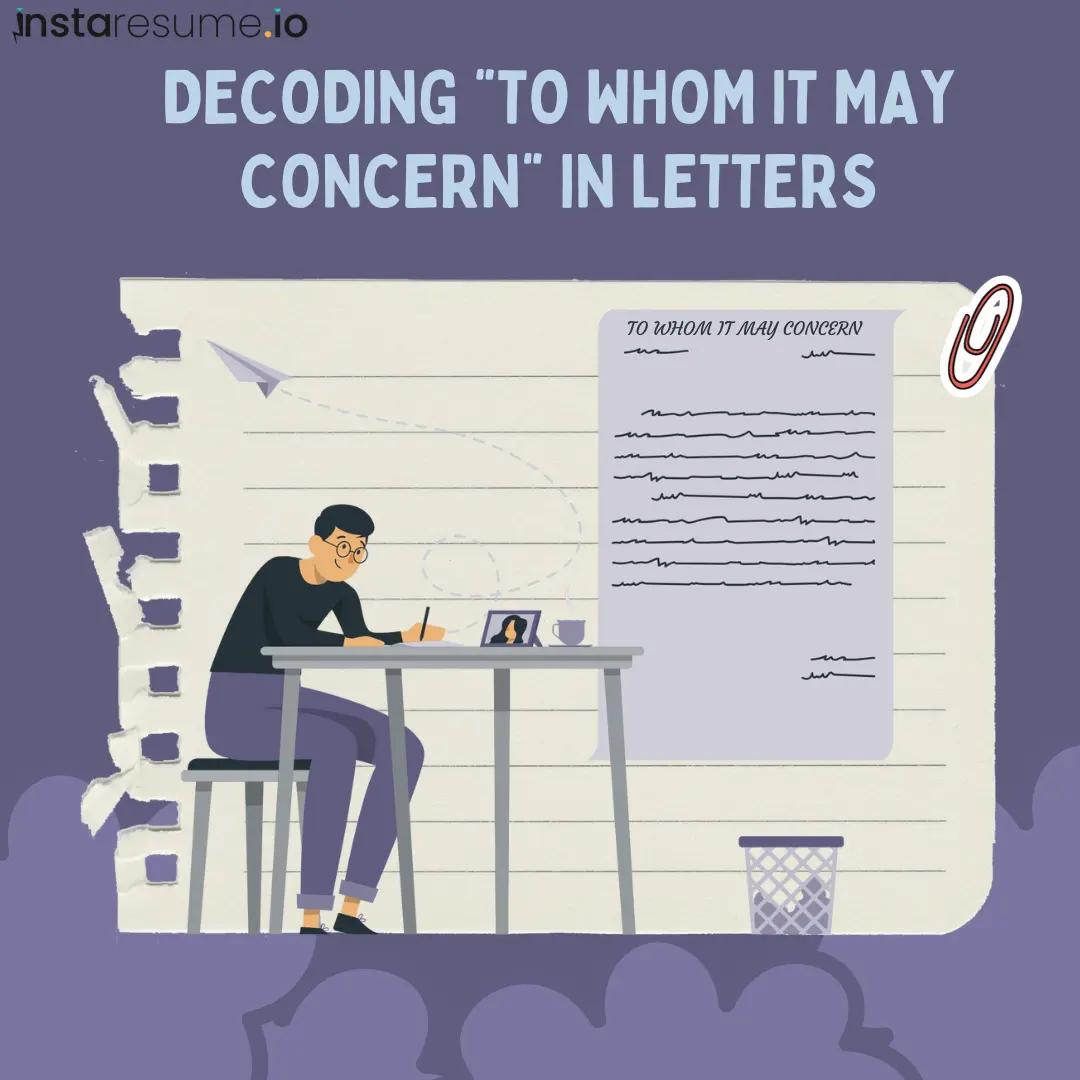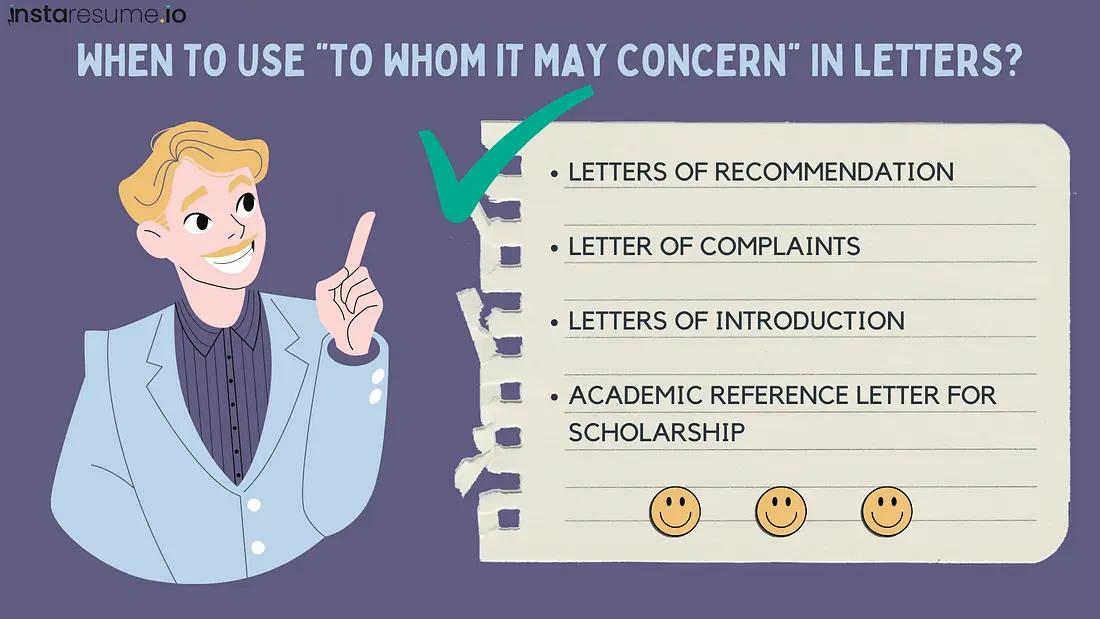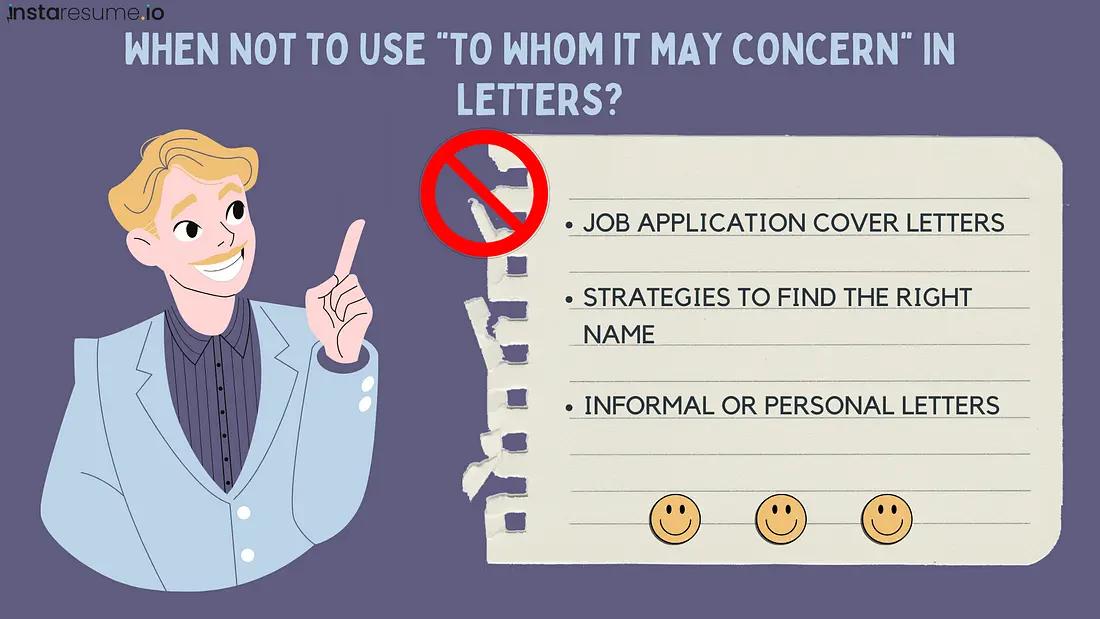To whom it may concern (Usages and Alternatives)
Trust Score: 4.7
358 reviews

Table of Contents
Decoding "To whom it may concern letter"
As we all know, letters are written to communicate effectively when face-to-face conversation isn’t possible. But what happens when you don’t know the name of the person you’re addressing? It might feel unprofessional, right? However, the phrase "To Whom It May Concern" offers a practical and formal solution.
Whether you're drafting a “To Whom It May Concern” letter format or seeking examples of “To Whom It May Concern” usage, this phrase maintains clarity and professionalism. It's especially useful when the recipient's identity is unknown but your message needs to reach the right person. From business letters with To Whom It May Concern to formal emails, this salutation ensures proper etiquette.
In this blog , we’ll explore when to use To Whom It May Concern, its meaning, and best practices. Additionally, we’ll provide templates, alternatives, and professional examples to ensure your communication is polished and effective. Whether you're curious about the correct punctuation for To Whom It May Concern or need a ready-made template, we’ve got you covered!
To Whom It may concern meaning
To Whom It May Concern is a generic greeting used at the beginning of a letter when the sender doesn't know the specific recipient's name. It's a catch-all phrase that addresses the letter to anyone who may be responsible for handling it. While it may seem impersonal, it remains one of the most practical choices for formal correspondence, especially when writing a "to whom it may concern letter template."
Think of it like this: if you're unsure who will be reading your letter or if multiple people could be involved, this phrase becomes your go-to. It's like casting a wide net to ensure your message reaches the right person. However, it’s not ideal if you know your audience, as using it in such situations may reduce its impact. Now, let’s explore the circumstances where using "to whom it may concern" is appropriate.
When to use “To whom it may concern”
Along with the guide for when to use "to whom it may concern" we are going to discuss its samples also so here we go:
1. Letters of Recommendation
Imagine you're applying for a job and need someone to write a recommendation letter for you. This person could be your boss, teacher, or someone who knows your work well. However, they might not know the specific recipient of the letter. It could be a hiring manager, company owner, or someone else entirely. In such cases, they use “To Whom It May Concern” to ensure the letter remains professional and works for anyone who reads it.
Example of a letter of recommendation:
[Your Name]
[Your Position or Affiliation]
[Your Contact Information]
[Date]
To Whom It May Concern,
I am writing to recommend [Name of the Person You're Recommending] for [Specify the Purpose, e.g., a job position, academic program, etc.]. I have had the pleasure of working closely with [him/her] for the past [length of time, e.g., two years] at [Your Company/School/Organization], where [he/she] has consistently demonstrated [specific qualities, skills, and achievements relevant to the recommendation].
[Provide specific examples or anecdotes showcasing the person's strengths, accomplishments, and contributions.]
Based on [his/her] outstanding performance and dedication, I am confident that [Name of the Person You're Recommending] will excel in [his/her] future endeavors. [He/She] possesses the qualities and skills necessary to succeed and make valuable contributions to any team or organization.
Should you require any further information, please do not hesitate to contact me at [Your Phone Number] or [Your Email Address].
Sincerely,
[Your Name]
2. Letter for complaints or general enquiries
When you're unsure who to address for a problem or query, starting your letter with “To Whom It May Concern” is a smart and professional choice. This approach helps ensure your message reaches the right person, maintaining respect and professionalism. Additionally, it keeps your privacy intact since you’re not naming a specific individual. This format works well for scenarios like reaching out to customer service or a particular department.
Example of a letter for complaints or enquiries:
[Your Name]
[City, State, Zip Code]
[Your Email Address]
[Your Phone Number]
To Whom It May Concern,
I am writing to express my concerns regarding [specific issue or complaint]. I recently [describe the situation or experience that prompted your letter]. Unfortunately, [explain the problem or dissatisfaction you encountered].
I would appreciate [describe what action you would like to see taken or information you are seeking].
Thank you for your attention to this matter. I look forward to your prompt response.
Sincerely,
[Your Name]
3. Letters of Introduction
When introducing yourself, especially within a large company setting where the recipient's name is unknown, “To Whom It May Concern” serves as a professional and effective salutation. This approach works well for initial contacts with various departments or individuals, helping establish connections for collaborations or networking.
Example of a letter of introduction:
[Your Name]
[Your Position or Affiliation]
[Your Contact Information]
[Date]
To Whom It May Concern,
I hope this letter finds you well. My name is [Your Name], and I am writing to introduce myself and express my interest in [purpose of your correspondence].
I am a [Your Position or Affiliation] with [number] years of experience in [relevant field or industry]. Throughout my career, I have [mention key accomplishments or experiences]. I am particularly drawn to [recipient's organization or industry] because of [specific reason].
I would welcome the opportunity to [mention potential collaboration, conversation, or next steps]. Please feel free to contact me at [Your Contact Information] at your convenience.
Thank you for considering my introduction. I look forward to the possibility of connecting further.
Sincerely,
[Your Name]
4. Academic reference letter for scholarship
When recommending a student or employee for a scholarship, particularly when the recipient's identity is unknown, using “To Whom It May Concern” ensures professionalism. It acknowledges the diverse audience scholarship committees often comprise.
Example of a scholarship recommendation letter:
Subject: Outstanding Scholarship Recommendation for [Student's Name]
To Whom It May Concern,
I am writing to enthusiastically recommend [Student's Name] for consideration for the [Name of Scholarship] scholarship. Throughout my tenure as [Your Position] at [Your Institution/Company], I have had the pleasure of witnessing [Student's Name]'s exceptional academic prowess, unwavering dedication, and remarkable character.
[Student's Name] has consistently demonstrated an insatiable thirst for knowledge, coupled with a strong work ethic that sets them apart from their peers. Their passion for [relevant field or subject] is evident in [specific examples of academic achievements or extracurricular involvement]. Moreover, [Student's Name] exhibits outstanding leadership skills and a genuine commitment to making a positive impact in their community.
I am confident that [Student's Name] possesses the qualities necessary to excel in their academic pursuits and contribute meaningfully to any scholarly community. Their intelligence, diligence, and integrity make them a deserving candidate for the [Name of Scholarship] scholarship.
Please feel free to contact me at [Your Contact Information] if you require any further information regarding [Student's Name] or this recommendation.
Sincerely,
[Your Name]
[Your Position]
[Your Institution/Company]
When not to use “To Whom It May Concern”?
Master these skills to kickstart your Career
Job Application Cover Letters:
Recruiters aren't looking for generic, one-size-fits-all cover letters. They're looking for personalized, thoughtful applications. Here's why you should steer clear of “To Whom It May Concern” and opt for a more tailored approach:
Strategies to Find the Right Name:
If you're unsure of the hiring manager's name, don't stress. There are several strategies you can employ to uncover it:
Image Description: Graphic depicting a magnifying glass zooming in on a job ad, company website, LinkedIn, and phone to represent different avenues for finding a name.
“To Whom It May Concern” Alternatives: Instead of defaulting to “To Whom It May Concern,” consider these alternatives that are more specific and engaging:
Here are some better options for addressing a cover letter with no name:
Dear Hiring Manager
Dear Recruiter
Dear [Department] Manager
Dear Recruiting Manager
Dear Hiring Team
Dear HR Manager
Dear HR
Dear [title of the person you would be reporting to]
Read more: Cover letter Heading format with samples to use
Also, if the name of the recipient is in public domain and you still use “To Whom It May Concern” it shows lack of care that you didn't try to find the name of the recipient and it may not produce the response you want from the other side.
Informal or Personal Letters:
When you're writing to someone on a personal or informal level, tossing in “To Whom It May Concern” can feel a bit stiff, keep it real and friendly instead! Try kicking off your letter with a warm “Hey [First Name],” or if you want to keep it a tad more formal, “Dear [First Name],” works like a charm. It's all about making that human connection.
“To Whom It May Concern” vs. “Dear Sir or Madam”
Traditional salutations like "To Whom It May Concern" and "Dear Sir or Madam" are increasingly viewed as outdated and impersonal in professional correspondence. Employers and organizations now prefer more personalized and inclusive greetings. Using these traditional phrases can suggest a lack of effort in identifying the recipient and may inadvertently convey a tone that is overly formal or detached.
Why Personalized Greetings Matter
Demonstrates Initiative:
Addressing your correspondence to a specific individual shows that you've taken the time to research and identify the appropriate contact person.
Enhances Engagement:
Personalized greetings can make your communication more engaging and relatable, increasing the likelihood of a positive response.
Reflects Modern Communication Standards: Contemporary business etiquette favors personalized and direct communication over generic salutations.
Inclusive and Gender-Neutral Alternatives
In line with evolving norms around gender inclusivity, it's advisable to use salutations that do not assume the recipient's gender. Here are some alternatives:
 Using the Recipient's Name: If you know the recipient's name, use it. For example, "Dear Alex Johnson," or "Hello Jordan Smith."
Using the Recipient's Name: If you know the recipient's name, use it. For example, "Dear Alex Johnson," or "Hello Jordan Smith." Professional Titles: If the recipient holds a professional title, address them accordingly, such as "Dear Dr. Taylor," or "Dear Professor Lee."
Professional Titles: If the recipient holds a professional title, address them accordingly, such as "Dear Dr. Taylor," or "Dear Professor Lee." Department or Team: When the specific recipient is unknown, you can address the department or team: "Dear Hiring Team," "Dear Customer Service Department," or "Hello Marketing Team."
Department or Team: When the specific recipient is unknown, you can address the department or team: "Dear Hiring Team," "Dear Customer Service Department," or "Hello Marketing Team." Role-Based Salutations: Addressing the recipient by their role can also be effective: "Dear Hiring Manager," "Dear Recruiting Team," or "Dear Project Coordinator."
Role-Based Salutations: Addressing the recipient by their role can also be effective: "Dear Hiring Manager," "Dear Recruiting Team," or "Dear Project Coordinator." General but Friendly: In cases where personalization isn't possible, opt for a friendly yet professional greeting: "Hello," or "Greetings."
General but Friendly: In cases where personalization isn't possible, opt for a friendly yet professional greeting: "Hello," or "Greetings."
Tips for Choosing the Right Salutation
Research the Recipient:
Whenever possible, find out the name and title of the person you're contacting. This information is often available on company websites or professional networking platforms.
Consider the Context:
The formality of your salutation should match the context of your communication. For formal correspondence, use "Dear [Title] [Last Name]," while in more casual settings, "Hello [First Name]" may be appropriate.
Prioritize Inclusivity:
Use gender-neutral language to ensure your communication is inclusive. Avoid assumptions about gender and use the recipient's full name or role instead.
By adopting these modern and inclusive salutations, you can enhance the effectiveness of your professional correspondence and make a positive impression on your recipients.
Tips for using “To Whom It May Concern” effectively:
1. Research if Possible:
Before resorting to this generic greeting, try to research the recipient's name. Check the company's website, LinkedIn, or contact the organization directly if necessary.
2. Keep It Formal:
“To Whom It May Concern” is best suited for formal correspondence. Maintain a professional tone throughout the letter.
3. Be Concise and Direct:
After the greeting, get straight to the point of your letter. Avoid lengthy introductions when using this phrase.
4. Proofread Carefully:
As with any letter, proofread for spelling and grammar errors before sending. A polished letter reflects positively on your professionalism.So, it’s recommended to use a writing checker that can help you identify and fix all sorts of mistakes.
To whom it may concern letter sample
Employment verification letter To Whom It May Concern
[Your Name]
[Your Address]
[City, State, Zip Code]
[Email Address]
[Phone Number]
[Date]
To Whom It May Concern,
I am writing to confirm the employment details of [Employee's Name], who has been employed with [Company Name] since [Start Date]. [Employee's Name] holds the position of [Job Title] and works [Full-time/Part-time] in our [Department Name].
[Employee's Name] is a valuable member of our team, and their duties include [Brief description of the employee's responsibilities]. If you need further verification of their employment status or require additional information, please do not hesitate to contact me at [Your Contact Information].
Sincerely,
[Your Name]
[Your Position]
[Company Name]
Download this format and change it as per your need
To Whom It May Concern Letter of Financial Support
[Your Name]
[Your Address]
[City, State, Zip Code]
[Email Address]
[Phone Number]
[Date]
To Whom It May Concern,
This letter is to verify that I, [Your Full Name], am providing financial support to [Name of the person being supported] for the period of [Start Date] to [End Date]. During this time, I will be responsible for covering [specific expenses, e.g., living costs, tuition fees, etc.].
I am financially capable of supporting [Name] in this regard, and I have attached the necessary documents to verify my financial status. If you need any further clarification or supporting documentation, feel free to contact me at [Your Phone Number] or [Your Email Address].
Sincerely,
[Your Name]
[Your Position]
[Company Name or Institution Name]
Download this format and change it as per your need
To Whom It May Concern Letter Cover Letter
[Your Name]
[Your Address]
[City, State, Zip Code]
[Email Address]
[Phone Number]
[Date]
To Whom It May Concern,
I am writing to express my interest in the [Job Title] position at [Company Name]. With [X] years of experience in [Relevant Field], I am confident that my skills and background make me a strong candidate for this role.
In my previous position at [Previous Company Name], I was responsible for [List of Duties/Accomplishments], which I believe directly aligns with the requirements for the position at your company. I have enclosed my resume for your consideration and would be delighted to further discuss how I can contribute to your team.
Thank you for considering my application. I look forward to the possibility of discussing this opportunity with you.
Sincerely,
[Your Name]
Download this format and change it as per your need
To Whom It May Concern Recommendation Letter
[Your Name]
[Your Address]
[City, State, Zip Code]
[Email Address]
[Phone Number]
[Date]
To Whom It May Concern,
I am writing to recommend [Name of the person you're recommending] for [purpose, e.g., a job position, academic program, etc.]. I have had the privilege of working with [Name] for [Duration] at [Company/Institution], where they demonstrated outstanding [skills/qualities].
During our time working together, [Name] consistently displayed [specific qualities or achievements], and I am confident that they will excel in any future endeavors. Please feel free to contact me for any further information regarding [Name]'s qualifications.
Sincerely,
[Your Name]
[Your Position]
[Company Name or Institution Name]
Download this format and change it as per your need
To Whom It May Concern Request for Information
[Your Name]
[Your Address]
[City, State, Zip Code]
[Email Address]
[Phone Number]
[Date]
To Whom It May Concern,
I am writing to request information regarding [specific request or issue]. I am currently [explain your situation or need], and I would appreciate it if you could provide me with the necessary details to assist with [your purpose].
If you require any additional information or documentation from my end to process this request, please let me know. Thank you for your attention to this matter.
Sincerely,
[Your Name]
Download this format and change it as per your need
To Whom It May Concern Sample Reference Letter
[Your Name]
[Your Job Title]
[Your Company/Organization Name]
[Your Address]
[City, State, ZIP Code]
[Your Email]
[Your Phone Number]
[Date]
To Whom It May Concern,
I am pleased to write this letter of recommendation for [Candidate’s Name]. I have had the privilege of working with [him/her/them] for [duration] at [Company/Organization Name], where [he/she/they] served as [Candidate’s Job Title or Role].
During this time, I have been consistently impressed with [Candidate’s Name]’s [mention key skills, qualities, or expertise]. [He/She/They] possess(es) exceptional [specific skill, e.g., leadership, communication, problem-solving], which has contributed significantly to [mention impact or achievement].
One of [Candidate’s Name]’s standout qualities is [mention a specific strength or quality], which was evident when [provide a brief example or anecdote]. [He/She/They] demonstrated [mention relevant abilities or accomplishments] and proved to be an invaluable asset to our team.
Beyond [his/her/their] professional abilities, [Candidate’s Name] is also [mention personal qualities such as reliability, work ethic, or character]. [He/She/They] is highly respected by colleagues and clients alike for [mention a positive trait, e.g., dedication, integrity, or collaboration].
I am confident that [Candidate’s Name] will bring the same level of excellence and commitment to any opportunity [he/she/they] pursue(s). I highly recommend [him/her/them] for [mention position, program, or general recommendation purpose] without reservation.
Please feel free to contact me at [Your Email] or [Your Phone Number] if you require any further information.
Sincerely,
[Your Name]
[Your Job Title]
[Your Company/Organization Name]
FAQs About "To Whom It May Concern" Letters
What does "To Whom It May Concern" mean in a formal letter?
"To Whom It May Concern" is a formal salutation used when you don’t know the name or identity of the person you're addressing. It is commonly used in official letters such as job references, complaint letters, company introductions, and business inquiries when the recipient is not specified.
When should I use "To Whom It May Concern" in a letter or email?
You should use "To Whom It May Concern" when you're writing a professional letter or email and you don't know the recipient's name or exact title. This is common in letters of recommendation, business inquiries, and formal complaints submitted to organizations or departments without a known contact person.
Is it okay to use "To Whom It May Concern" in a job application?
It is acceptable, but not recommended, to use "To Whom It May Concern" in a job application cover letter. If you can’t find the name of the hiring manager, using "Dear Hiring Manager" is a better and more modern alternative. Personalized greetings are more likely to make a positive impression on recruiters.
What are better alternatives to "To Whom It May Concern"?
Some better alternatives include "Dear Hiring Manager," "Dear Customer Support Team," or "Dear Human Resources Department." These options provide a more targeted and professional tone while still addressing the letter to the appropriate party when a name is not available.
How should I format a letter that starts with "To Whom It May Concern"?
Start the letter with the salutation "To Whom It May Concern:" using a colon, not a comma. Follow standard business letter formatting: include your contact information, the date, and if available, the recipient's address. Maintain a formal tone and use clear paragraphs to explain your purpose, details, and conclusion.
Is "To Whom It May Concern" still used in modern business communication?
Yes, it is still used in certain professional situations, though less commonly than before. While some consider it outdated or impersonal, it remains appropriate when no contact information is available. However, modern business etiquette recommends using more specific salutations whenever possible.
Can I use "To Whom It May Concern" in a professional email?
Yes, you can use "To Whom It May Concern" in a formal email when the recipient is unknown. It is appropriate for professional emails like business inquiries, reference letters, or feedback requests. However, identifying the correct contact person can help you get a faster and more personalized response.
What are common mistakes when using "To Whom It May Concern"?
Common mistakes include using this greeting when the recipient’s name is known, using a comma instead of a colon, and neglecting formal formatting in business letters. Another frequent error is failing to tailor the letter content to the purpose, making it appear generic or careless.
How can I find out who to address instead of writing "To Whom It May Concern"?
You can find the correct person to address by checking the company’s official website, LinkedIn profiles, or calling the organization directly. Searching for “who to contact for [your specific need]” can also help personalize your letter and make a stronger impression.
Are there cultural differences in using "To Whom It May Concern"?
Yes, the use of formal salutations varies by country and culture. In some places, "To Whom It May Concern" is widely accepted in formal communication. In others, especially in informal or digital-first industries, it may be seen as outdated or too generic. Always consider the industry and cultural norms of your audience.
What are some situations where "To Whom It May Concern" is appropriate?
It is appropriate when writing general reference letters, submitting proposals to companies without a known contact, filing formal complaints, or introducing yourself or your company without knowing who will read the letter. These are all cases where no specific recipient is identifiable.
Can I use "To Whom It May Concern" in a recommendation letter?
Yes, using "To Whom It May Concern" is appropriate in a recommendation letter when you don’t know the recipient’s name or the exact job title. However, if the letter is for a specific job, school, or company, try to personalize the greeting to show attention to detail.
What punctuation should I use after "To Whom It May Concern"?
You should use a colon (:) after "To Whom It May Concern" in formal writing. For example:
To Whom It May Concern:
Using a comma is grammatically incorrect in formal business correspondence.
Do I capitalize every word in "To Whom It May Concern"?
Yes, you should capitalize each word in the phrase: "To Whom It May Concern." This is standard in professional business writing and helps maintain the formal tone of the letter.
Does using "To Whom It May Concern" affect how seriously my letter is taken?
In some cases, yes. If the recipient feels you could have found their name easily, they may view the letter as lazy or impersonal. Whenever possible, address the letter to a specific person to improve professionalism and increase the likelihood of a response.
Conclusion:
In the realm of formal correspondence, “To Whom It May Concern” serves as a versatile tool for addressing letters when the recipient's name is unknown. Whether applying for a job, making inquiries, or writing recommendations, understanding when and how to use this phrase can enhance the professionalism of your communication. By following the guidelines outlined in this blog, you can wield “To Whom It May Concern” effectively and confidently in your letters, ensuring that your message is received with the appropriate level of formality and respect.








